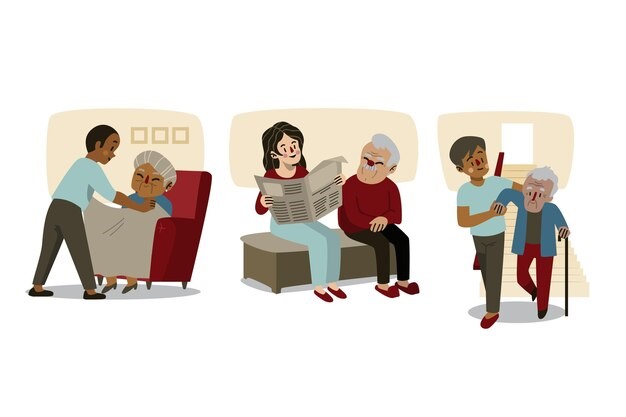In the later stages of life, many seniors find themselves facing the profound challenge of loneliness. The absence of regular social interaction and meaningful companionship can significantly affect their mental, emotional, and even physical well-being. This is where companionship and social care play a transformative role, offering emotional support, fostering connections, and ensuring seniors lead fulfilling lives. By addressing the silent epidemic of loneliness, companionship services not only enhance quality of life but also create a sense of belonging and purpose.
The Hidden Toll of Loneliness
Loneliness among seniors is a growing concern worldwide. With children moving away for work, friends passing on, and health challenges limiting mobility, many elderly individuals find themselves spending long hours alone. According to research, nearly one in three seniors in the UK reports feeling lonely regularly, a statistic that underlines the urgency of providing support.
The impact of loneliness goes far beyond emotional sadness. Studies have shown that prolonged isolation can lead to serious health issues, including high blood pressure, weakened immune systems, and increased risks of cognitive decline and dementia. Mental health is equally affected; seniors experiencing chronic loneliness are more prone to depression, anxiety, and reduced self-esteem.
These challenges often create a vicious cycle, where feelings of isolation discourage seniors from seeking out social interaction, further deepening their sense of loneliness. Breaking this cycle requires proactive measures, and companionship and social care services are uniquely positioned to meet this need.

The Role of Companionship and Social Care
Companionship and social care services are designed to provide consistent emotional and social support to seniors, bridging the gap between isolation and meaningful connection. Whether through casual conversations, shared activities, or accompanying seniors to social outings, professional caregivers offer much-needed interaction that promotes mental and emotional well-being.
Fostering Emotional Support
At its core, companionship care is about listening, understanding, and building trust. For seniors, having someone to share their thoughts, memories, and experiences with can be incredibly therapeutic. Caregivers trained in companionship understand how to engage seniors in conversations that not only alleviate loneliness but also boost their confidence and sense of identity.
For example, reminiscing about the past can evoke happy memories and create a sense of continuity in their lives, while discussing current events or hobbies can keep them mentally engaged and aware of the world around them.
Combating Isolation Through Social Interaction
One of the most impactful ways that companionship services address loneliness is by reintroducing seniors to social interaction. Many older adults feel disconnected from their communities due to physical limitations, lack of transportation, or the loss of loved ones. Companionship caregivers help bridge this gap by facilitating opportunities for seniors to connect with others.
Encouraging Hobbies and Interests
Caregivers often encourage seniors to pursue hobbies or activities they enjoy, such as gardening, knitting, painting, or playing games. Engaging in these activities not only provides a creative outlet but also fosters a sense of accomplishment and joy.
In cases where seniors can no longer physically engage in certain hobbies, caregivers can adapt the activities or find new interests that are accessible and enjoyable. For instance, a senior who loves gardening but struggles with mobility can work on indoor plants or plan garden layouts with the caregiver’s assistance.
Supporting Social Engagements
Social care often involves accompanying seniors to community events, religious services, or family gatherings, helping them maintain a sense of belonging. This support is especially valuable for those who feel intimidated by navigating public spaces alone or have mobility challenges.
For seniors who prefer quieter interactions, caregivers can arrange small, meaningful social activities, like hosting tea sessions with neighbours or scheduling video calls with distant family members.
The Physical Benefits of Companionship
The positive effects of companionship and social care are not limited to emotional well-being; they extend to physical health as well. Engaging in regular social activities has been shown to reduce stress, improve heart health, and even boost life expectancy.
Caregivers also play an essential role in ensuring seniors maintain healthy routines. From encouraging daily walks and light exercises to preparing nutritious meals, companionship care often encompasses elements of physical support that enhance overall health. Seniors who feel connected and cared for are more likely to adhere to these routines, contributing to their physical resilience.
The Importance of Personalised Care
No two seniors are alike, and their social and emotional needs vary widely based on their personalities, life experiences, and health conditions. Companionship and social care services are most effective when tailored to the individual, taking into account their preferences, communication styles, and goals.
For example, a naturally extroverted senior might benefit from group outings or visits to community centres, while a more introverted individual might prefer quiet one-on-one conversations or shared activities like reading or watching films. Personalised care ensures that seniors feel valued and respected, making the experience both enjoyable and meaningful.
Supporting Families Through Companionship Care
Companionship and social care do not just benefit seniors; they provide immense relief to families as well. Many families worry about the emotional health of their elderly loved ones but are unable to offer the time and attention required due to work and other commitments. Knowing that a trusted caregiver is providing regular social interaction and support can ease this concern and bring peace of mind.
Furthermore, caregivers often act as a bridge between seniors and their families, sharing updates about their emotional and physical well-being. This ensures that families remain connected and informed, even if they cannot be physically present.
Loneliness in seniors is a pressing issue, but it is not an inevitable part of aging. With the right support, seniors can lead socially active, emotionally fulfilling lives. Companionship and social care provide an essential solution, addressing the mental and emotional impacts of loneliness while fostering connections and enhancing quality of life.
If you’re seeking compassionate and reliable companionship care for your loved ones, SD Home Care offers tailored services to meet their unique needs. From emotional support to facilitating social activities, their experienced caregivers are dedicated to ensuring seniors remain engaged, happy, and connected. Let SD Home Care help your loved ones rediscover the joy of companionship and the comfort of meaningful interaction.


